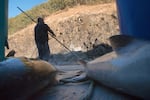
Tribal fishermen use dip nets to fish from platforms at Lyle Falls. Platforms are maintained and improved by the fishermen throughout the year.
Sean O’Connor
At Lyle Falls, Washington’s Klickitat River rushes through steep canyon walls toward the Columbia River Gorge.
It’s one of a few places where members of the Yakama Nation still fish from scaffolds using dip nets. Fishermen say it’s the only place that comes close to what used to exist at Celilo Falls on the Columbia River.
For thousands of years, generations of tribal fishermen have learned to fish on platforms above the falls. That tradition continues in fishermen like James Kiona Jr., who grew up watching his elders fish here.
“As a young kid, I ran up and down this whole river – just all over the place with my brothers and sisters and cousins," he said. "All the elders would tell us to be careful around the river because it is a very violent river.”
When he was old enough, his father, James Kiona Sr., taught him.
“I wanted to teach him earlier, but you’ve got to want to fish," said Kiona Sr. "When he decided that he wanted to fish, that’s when I taught him.”
You can hear the sound of the falls in the parking lot above as Kiona Jr. grabs his dip net. The pole attached to the net is more than three times his height. He checks for holes in the hand-tied mesh inside the hoop at the end of the pole.
"My father made this net," he said. "He's shown me how to make these nets. These are all like half-hitch knots."
He sets the pole down on the edge of the steep rock ledge above the river. Then, he slings a rope around his waist, climbs down the near-vertical rock to a wooden platform and pulls the 30-foot pole down from the ledge.
As he dips the net into the churning water below, he’s following a longstanding tribal tradition. When they're here, he says, he and his father are part of larger family of tribal fishermen.

James Kiona Jr. uses a dip net to fish for salmon on one of the scaffolds at Lyle Falls.
Sean O'Connor
"It’s like a community up here," said Kiona Jr. "All the people who fish here, they’re all my relatives. They’re all my family. When you get up here, it’s like a different world. Even though town is just a few minutes away, there's a different culture – a different feeling.”
For generations, tribal members have fished along these rock walls, learning from their elders how to use the dip net to feel for the fish below.
"Rock. Piece of wood. Fish. You know the difference. You can feel it,” said Kiona Sr.
And when a salmon hits the net, the fight's on.
"Oh man, so exhilarating," said Kiona Sr. "It'll get your blood pumping. It requires a lot of upper body strength because you have to pull the pole up. The river's narrow, so you can't just pull it straight in."
For Kiona Sr., this fishery has taken the place of Celilo Falls on the Columbia River, where he grew up.

Tribal fishermen at Lyle Falls wear a rope around the waist to catch them in case they fall off the fishing platform.
Sean O'Connor
“I used to run around there when I was a kid," he said. "I’d pack fish for the fishermen. They’d give me a nickel – nickel for a fish.”
When The Dalles Dam was built, the falls were flooded, and the fishery at Celilo was lost.
"You know, we’d seen he falls go under before," he said. "When the high water came, you’d just have to sit and wait ’til the falls came back. This time they didn’t come back.”
Keeping the tribal tradition at Lyle Falls hasn’t been easy, according to Johnny Jackson, a chief with the Cascade Tribe within the Yakama Nation. When he was younger, Jackson would fish here at night, hiding in the rocks from state game wardens who arrested many his family members.
“I’m 85 years old," he said. "I might not be here that much longer. But this is where I learned to fish. I remember when the state used to try to push the Indians off the fishery here, and stop them from fishing here. Our people had to fight back – and still fish."

The salmon harvest is stored in large coolers to be brought to market and sold. Buyers include restaurants, individuals and local grocery markets.
Sean O'Connor
Jackson said the tribes refused to give up their right to fish for salmon back then, and they're still holding onto that right today.
James Kiona Sr. said he hopes the tribes can keep the Lyle Falls fishery going strong by leaving some fish in the river and continuing to pass their knowledge down from generation to generation.
“We don’t fish to the last fish," he said. "We fish to catch what we need to support our families, and we have closures to let the fish go by. So we know there will be more fish coming back in the years to come for our children and our grandchildren.”
